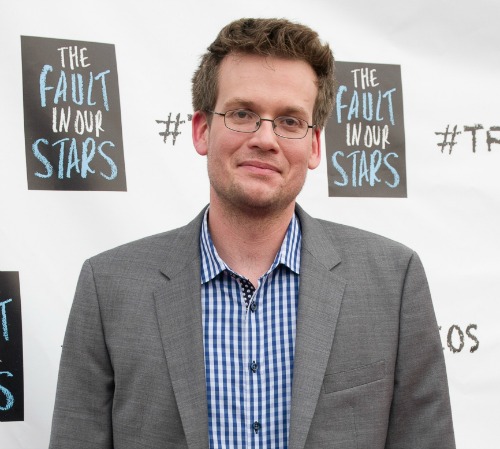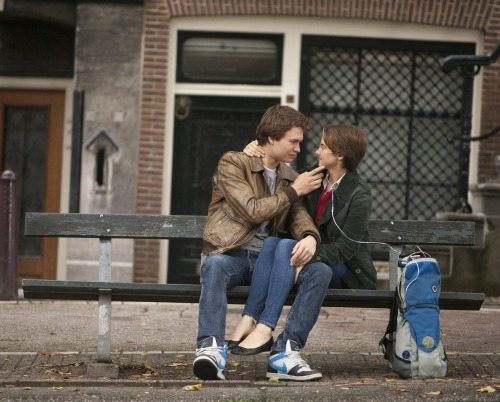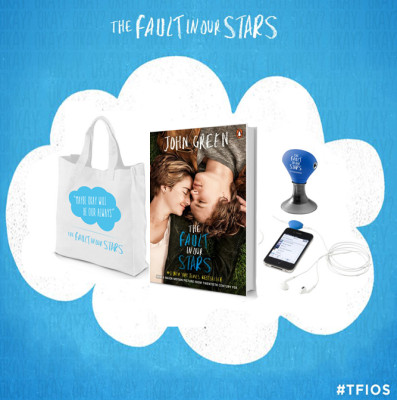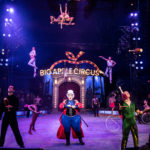
Image via Twentieth Century Fox
I was recently part of a group of culture and book bloggers who asked author John Green a few questions about the upcoming release of the film adaptation of the he extremely popular young adult novel The Fault in Our Stars. His excitement for the film was quite infectious, even over the phone, and there can’t be anyone more excited about the release of the film…except the public. Since the official trailer was released by Twentieth Century Fox a few short months ago, it has received over 19 million views.
Here’s what I found out about his involvement with the making of the film, his fear in getting it made in the first place and how he feels about being compared to Judy Blume.
You were nervous to give over the rights to the film because the book was just so personal to you. What was your biggest fear in doing so?
John Green: Well, I think it’s really hard to make a movie that’s serious or about serious topics without sentimentalizing it. And so, I guess my fear was that it would become a sentimental story, which is what I most didn’t want. I was trying really hard to write as unsentimental and straightforward a story as I could. I was also worried that the characters would be defined by their disability, instead of having disability be part of their lives but not the defining feature of their lives. But, the people who ended up getting the rights at Fox 2000 and the producers, Wyck Godfrey and Isaac Klausner, they just promised me that they wouldn’t do that. That was the first thing they said to me when we met, and I believed them. I took it seriously, and they kept every promise. They really did.
Was there a point at which it just felt different and you really knew that it was going to all come together?
JG: When they hired Josh (Boone) to direct it, people said to me, “They don’t hire a director unless they’re going to make the movie.” But I still–I didn’t believe that, because people in Hollywood say a lot of things. To be honest with you, I flew out to Pittsburgh thinking that they might pull the plug at the last second. I remember asking the producer of the movie, “What is technically the commencement of principal photography,” because that’s when it gets very, very, very expensive not to make the movie. And he was like, “We’re going to make the movie. It starts filming tomorrow.” And I was like, “But, this is not technically the commencement of principal photography?” And he was like, “No, that’s tomorrow.” And I was like, “Well, we’ll see.” So, I mean, I did not let myself believe that it was going to happen until I was on set that morning, that first morning. I saw Hazel and her parents walk out of their house together and the cameras were rolling, and then I knew. And that was a great. It was almost like they designed that whole first day to be metaphorically resonant for me, to have them walking out of this house that looked so much like the Hazel’s house of my imagination and these people who looked so much like I’d dreamt of. It was like having a hallucination but that happens two or three years after you think the thing.
A lot of people have claimed you’ve done what Judy Blume never achieved.
JG: Right, which is ridiculous. Blume has achieved a lot that I haven’t.
What do you think that you, with the notoriety that’s coming from The Fault in Our Stars and then the YA community as a whole, can do to combat these misguided perceptions as the popularity of The Fault in Our Stars and similar properties increases?
JG: I can only–every time I’m asked that question, like “Oh, this is such a departure from dystopias or vampires,” I’m like, “Not really,” because really the world of contemporary realistic young adult fiction is very old and very well established. And I am but one writer and not the best, not even near the best, I don’t think, in that world. And also that I think part of what makes YA so strong is that there’s a longstanding conversation between and within genres. You have sci-fi books and fantasy books interacting with and responding to realistic fiction and mysteries, and one of the things I really love about YA is all that stuff sharing a shelf. I try really hard to talk about that in interviews, to talk about the way that it looks very different to us from inside the world of YA, that it isn’t about one book or one story, and that there’s hundreds and hundreds of books every year that are read by at least 10,000 teenagers. And that, to me, is the real story about YA, is its diversity and breadth, and finding way to preserve and grow that diversity rather than celebrating single titles.
We were wondering about some of the backlash that the trailer got from people who haven’t read the book saying things like Augustus is pretentious or that it’s romanticizing illness. What do you think about that?
JG: Well, I mean, Augustus is pretentious in the beginning of the book. In fact, like, several characters–I mean, I think Hazel calls him pretentious at one point. Isaac calls him a self-aggrandizing bastard. The other characters are aware of Gus being sort of pretentious and performative. The journey that Gus has to make is a journey from strength to weakness. I think the heroic journey that we’re accustomed to is from weakness to strength. But, Gus has to go from being this sort of performed, over the top character to being authentically himself. And that means being vulnerable and that means being scared. And that’s heroic, more heroic than his sort of swagger and pretentiousness toward the beginning of the story. I think that you see that in the movie. By definition, it’s difficult to see that in a trailer. The like to dislike ratio on the trailer on YouTube made me very, very happy, and I continue to think the people who made the trailer did a great job. But, obviously you can’t chart the whole story in the trailer or there would be no reason to see the movie.
Did you see the book as a film when you were writing it?
JG: I did not see it as a film. I couldn’t imagine a world in which this movie would get made. I never—it’s not something I think about when I write, really, to be honest with you. I mean, they never made a movie out of any of my other books, so I certainly didn’t think they’ve make a movie out of this one.
Where there any passages that you were adamant about staying in for the movie?
JG: No. I was so lucky. Mike Weber and Scott Neustadter, who wrote the script, have such a deep love for the book. They were really passionate about it. They wanted to preserve not just the tone and themes of the book but as much of the actual words of the book as possible, and I think they did an amazing job. They saw what people were responding to, making art about, and it was important to them to keep it in.

Image via Twentieth Century Fox
Was there anything in the book, like a character or a scene that the film adaptation made you see in a different light?
JG: It helped me to think differently and I guess more broadly about Gus, the challenges that he’s been through before the story begins, how that’s given him confidence but how also that confidence is real and it’s earned because he has integrated this disability into his life. But, it’s also a way of protecting himself. It’s also a way of protecting himself against the things that are harder for him now, or the way that his life has been changed, physically and emotionally by his disability.
Did you envision anyone playing these roles when you were writing the book at all?
JG: Almost immediately, even when she was auditioning, Shailene became Hazel for me. Hazel just looked like Shailene and talked like Shailene talks as Hazel. In terms of casting, I had a voice. You know, I’m not a casting director. I didn’t direct the movie, so it wasn’t my decision, certainly.
And so, seeing the movie, I thought very differently about Augustus and about Hazel’s parents, and even about Van Houten. Each of those actors brings to their performance a realness, a sense that they are the center of their own story, just as anyone is.
What was your role during the filming and did you visit the set?
JG : I was there for almost every day. I would say at least 80% of the time. I usually went home on Thursday night so that I could spend a few days with my family. I didn’t have a role. But, I think it’s nice to have somebody on a movie set who’s not doing anything, because everyone else is so busy and they’re working so hard and they’re talking about, “Did we get this coverage or that coverage,” and, “Did we get it this way? Did we get it that way? Did the light change?” And I could just be like, “Hey, everybody, hold on for a second. This is awesome. Let’s take a step back and realize how ridiculously awesome this is.” What I found is that, when people come in and they’re passionate and they really care about the story, it can add to it. It can bring new things to it. So, every day it just felt wonderful on the set. It really did. I mean, I just felt like I was being given such a tremendous gift just to be able to be there and watch them make this movie, make it so carefully and thoughtfully.
How much experience did you have with other amputees? And were you concerned specifically about getting those details right, like the everyday life things that Gus went through?
JG: Yeah, I was concerned about it, and I did speak to one other person. Josh’s amputation is much, much higher up because he lost much of his hip. So he doesn’t walk with a prosthetic. He can, but he doesn’t usually. He almost always uses crutches now. The prosthetics are really good, as I’m sure you know. I wanted him to be at a place physically where it’s integrated into his life so that he can–you know. The thing that I was worried about is things like sitting all the way down on the grass in a big open field, and then figuring out how to get up. But, when we were filming the movie, we worked with this guy, Tanner, who had basically the exact same amputation as Gus, although from a hunting accident, not from osteosarcoma. And he worked a lot with Ansel and also was our stunt double, I guess.

The Fault in Our Stars Giveaway
Guess what? I’m giving away a copy of The Fault in Our Stars (FIOS) book, a FIOS tote bag and a FIOS headphone splitter with phone stand. Open to U.S. mailing addresses only.
To win, just comment below and let me know how you feel when books are turned into films and if you are anxious to see how FIOS turned out. Also, you must follow the Culture Tripper Facebook page (no need to tell me, I can check).
Winner will be selected randomly. Each winner will receive two tickets, which will be held at the box office day of show in your name. This giveaway will end on Friday, June 6th at 9am EST. Winner will be posted here, on the Culture Tripper Facebook page and via email and will have 24 hours to accept their prize.
Disclosure: I was not compensated to write this post. Giveaway is courtesy of 20th Century Fox.
Final note: The author’s enthusiasm for the upcoming film was infectious, and I’m counting down the days until its release on June 6th.







 Follow
Follow





I like it when books are turned into movies because it is always interesting to see if the way I pictured a novels characters and scenes are what the movie depicts. I do however like to read the book before the movie.
I have seen the proms for this movie and it loos heartwarming as well as heart breaking. I never read the book but now I might have to!
I love reading books. Before I want to buy that book, but I don’t have enough money to buy that one. So I guess this is my chance to have that book. I love book giveaways. 🙂
I haven’t read the book yet. Wish I could win. 🙂
I always feel the book is better than the movie, but I have heard so many wonderful emotions that go along with this movie. I haven’t read the book yet so this would be great.
I for one cannot wait to see this. The book was amazing and I think they took a lot of care with this movie and kept the tone and spirit
I have been very interested in reading this book. I tend to be disappointed by books turned to movies. I am still hoping that I will get the same feelings from a book turned movie one day. I always try to read book first before the movie.
I loved the book so much, and I’m very excited for the movie. I pre ordered the book, and read the entire thing the day it came out. I’ve read it a few more times since then, and it still gets me everytime. I plan on seeing it with my mom the day it comes out. I really trust the people making the movie, I think they know what they’re doing, and what needs to be said.
You won! Congrats. I’ll be in touch.
My daughter has been a long time fan of Mr. Green (and his brother) She is a voracious reader and adores his books. She insisted I advance order TFIOS so she could get an autographed copy. That was all she wanted for Christmas. She insisted I read it. Of course I did. I laughed, I sobbed, I sobbed some more.
Recently a friend asked “Isn’t that “Young Adult” genre? Well, technically, I guess it is. But it is so beautifully written I can’t imagine any “old” adult not enjoying it as much as I did. It is beautiful.
We are hoping to see the movie asap.
Great job with your interview. I will be sharing with my daughter. She will be most jealous of you! XOXO
Anne
My 11 year old and I both read this book independently so we could discuss it. It was so beautifully written that we both loved it. We are both looking forward to this movie that is not dystopian. The goodies would be an added bonus.
This book has been trying to get my attention for a while! (Barnes and Noble visits have helped with that.) What an exciting moment for the author.
went to KENYON WITH HIM, too.
love his books.